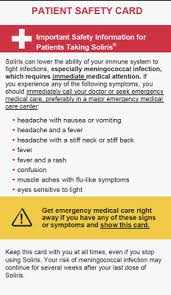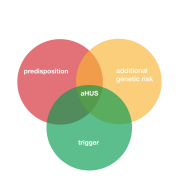A few days ago an article appeared in The Lancet which claims to be the largest real world analysis of complement inhibitor treatment of aHUS patients.
It is a retrospective study of patients enrolled in the ERKNet Registry – or the TMA section of it which also includes “iHUS” patients ( as they seem to call them for now they will I-TMAs in the new nomenclature)- and covers those patients enrolled between the registry start in 2019 and 31 January 2024 who have had complement inhibitor treatment.
There were aHUS 238 aHUS patients enrolled from from 24 Countries.
85 with known genetic predisposing variants , 48 with anti complement factor H autoantibodies and 105 with unknown genetic factors.
Of all enrolled there were 182 ( just over 75%) who had been treated with a complement inhibitor. Their median treatment duration was 16 months. There is no doubting the better health outcomes from being treated. Only 1 patient had died.
108 patients were to discontinue eculizumab and ravulizumab treatment. The median discontinuation period at 31 January 2024 was 3.5 years.
13 patients had relapsed. 8 with known genetic predisposition, 2 with no genetic variant found and 2 who amazingly had not been tested before discontinuation. No patients with anti complement factor H antibodies relapsed.
Of the 13 who relapsed. 9 re-discontinued after resuming treatment for 10months and 8 of them remain discontinued. 2 of the 13 had required dialysis on relapse but they like the others regained their pre discontinuation eGFR on return to treatment. Taking on average 4 months to do so. Relapse aHUS TMA was described as being “mostly mild”.
The good discontinuation outcomes were put down to centres with greater awareness of relapse chance , early detection, rapid pathway to care and timely resumption of complement inhibitor treatment. There was an acknowledgement that such centres of expertise may not be universally available.
Over all as 31 January 2024 101 out of 108 patients stopping treatment remain off treatment. 92% of the 60% of all treated patients were weaned off treatment. Over 50% of them.
Relapse chances were assessed as 35% of patients with known genetic variants, 15% of those with none. And 0% for those with anti complement factor H antibodies. So more went into a longer term remission.
The Netherlands and France were the two leading countries for treatment discontinuation with the numbers stopping treatment by 12 months as 100% and 61% respectively. So there is more potential for treatment discontinuation particularly in eastern EU countries.
Overall 86% of patients with CHF variants remained on treatment, 83% with CFI , 67% with C3 and only 35% with MCP/CD46.
The ERKNet registry patient cohort is predominantly children, in the TMA section there 7 times as many active pediatric participants than adults)
Data for this study was collected from 36 pediatric hospitals and 11 adult hospitals so more younger patients included and the gender mix is slightly more males than females. So these results may be of special interest to aHUS parents.
Overall yet more real world evidence which supports the design and use of Global Action’s Treatment Discontinuation Model by patients when having that “stopping treatment discussion”.
Article No. 726
Previous articles about treatment discontinuation can be found at this link:

Discontinuation – no longer needing complement inhibition
Complement inhibition treatment discontinuation is a topic that Global Action has led on in the aHUS patient advocacy world for several years. More than anyone else our website has provided…


